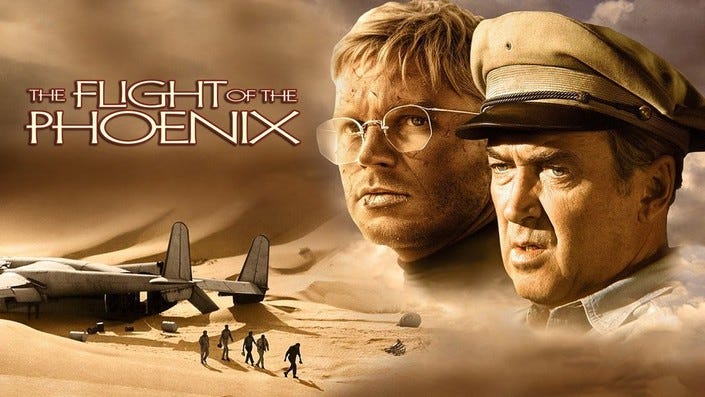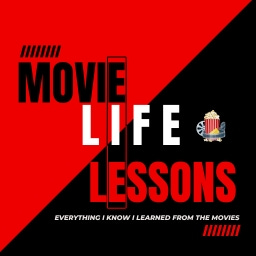Movie Life Lesson: From Flight Of The Phoenix to Iron Man - Fiction Shows Us the Way Forward
In the classic 1965 film Flight of the Phoenix, directed by Robert Aldrich and starring James Stewart, Richard Attenborough, and Peter Finch, a group of survivors stranded in the desert must rebuild their crashed cargo plane. Their only hope? A stiff, awkward German engineer who claims he designs aircraft for a living—only to later reveal he designs model airplanes. The survivors feel betrayed... until the damn thing actually flies.
It's a movie about the value of bold ideas—about what happens when someone sees the world differently and convinces others to take a leap of faith.
The best fiction doesn't just entertain—it plants ideas. Wild, ridiculous, beautiful ideas. And sometimes, those ideas are what save us. If fiction can inspire iPhone interfaces and autonomous vehicles, why limit it to technology? The same movies that predicted GPS are also teaching us about leadership, conflict resolution, relationships and human potential.
Take Elon Musk. Faced with production bottlenecks at Tesla, Musk did something no one in the auto industry took seriously: he turned to toy cars for inspiration. Specifically, die-cast toy cars, which are molded in a single piece. Musk wondered: why couldn't Tesla do the same with a full-size chassis?
His team told him it wasn't possible. So he made a massive giga-casting machine and made it possible. The result? Fewer parts, faster production, lower costs. A revolution born from a toy box.
The parallels are striking: in Flight of the Phoenix, the men trust a model maker and get off the ground. In real life, Musk finds inspiration from a toy—and builds one of the most advanced car production systems in the world.
And this isn't a one-off. The history of innovation is littered with fiction turned real:
• Star Trek inspired the flip phone.
• Asimov inspired robotics.
• Ray Bradbury inspired voice-activated tech, smart homes, and wall-sized TVs.
Take Stan Lee's Marvel characters, who regularly revealed the future in their fiction. In 2008, Robert Downey Jr. as Tony Stark is building his Iron Man suit by talking to his AI assistant Jarvis—designing it, testing it, even picking the paint job, all through voice commands.
There is an amusing sequence in *Star Trek IV: The Voyage Home*, where we see Dr. McCoy basically curing patients with 24th century medicine: one woman gets a pill to rebuild her failing kidney, and he brings Chekhov out of a coma by simply placing a device on his head. These may still be science fiction, but with AI now applying its intelligence to solving our medical ailments, maybe these devices will soon move from the pages and screens of fiction to reality.
Fiction isn't just entertainment—it's a blueprint for the future. Model airplanes, die-cast cars, AI assistants, medical devices that repair organs with a touch—and lessons in courage, strategy, and wisdom that make us better humans. The same imagination that gives us flying cars also gives us new ways to think about justice, love, and meaning.
Every hero's journey teaches strategic thinking. Every moral dilemma on screen is a case study in ethics. Every fictional universe builds its own philosophy of what it means to be human—or alien, or AI, or superhero—and these philosophies become templates for how we approach our own lives.
Next time you're stuck in reality's limits, look to fiction. It's already showing you the way forward.






The most recent example, for me personally, has been the Londoners vandalizing ULEZ cameras. Essentially, they track your number plate to ensure you've paid a carbon tax.
Those that destroy them have been nicknamed 'Blade Runners'. Art imitating life is entertaining, but life imitating art has real consequences.